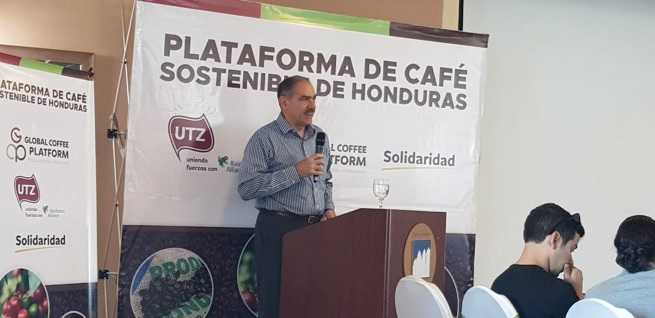TEGUCIGALPA, Honduras – With the main objective of contributing to improving the livelihoods of families of small coffee producers, the Honduran Platform for Sustainable Coffee, PCSH, was launched supported by the coffee sector of the country, the Sector Partnership Program of Rainforest Alliance/UTZ, Solidarity and the leadership of the Global Coffee Platform, GCP.
Likewise, the selection of the members of the Coordinating Commission was carried out.
Members elected were: Julia Vásquez (ANACAFEH) and Zoyla Moreno (DO MARCALA) representing producers; Roberto Salazar (COCAFELOL) representing Cooperatives; representative from AHICAFE; Miguel Pon (ADECAFEH); Flor Zelaya (18 Conejo) representing independent exporters; Napoleón Molina (RIKOLTO) representing service providers; Waleska TAbora (AMUCAFEH) representing women organizations; Edwin Pérez (AELS) representative of youth; Jacobo Paz (CONACFE) representing government or public sector; and the facilitators committee represented by RA, GCP and Solidaridad (no voting members).
Jacobo Paz, Executive Secretary o the National Coffee Commission, CONACAFE, expressed,”70% of our coffee is exported to Europe where the consumer demands it is sustainable, meaning it is produced environmentally friendly, does not hire child labor, it offers fair prices for producers.” Low prices were also part of Juan Orlando Herández’s, President of Honduras, speech during United Nations Assembly. Paz also said, “it is an open platform where all actors of the industry can participate: all growers, exporters, intermediates and NGO’s supporting the sector.”
Rubén Gallozzi, country representative of Rainforest Alliance/UTZ in Honduras, explained, “the platform is a space of collaboration and coordination to discuss relevant issues and possible solutions, such as, high costs of production, climate change, quality improvement.
We, as part of the organizing committee of the PCSH in alliance with GCP and Solidaridad, and 13 initial members launched the platform that has also attracted the interest of many more actors,” he concluded.
In search of sustainability
Since 2016, these three organizations have agreed to promote actions aimed at consolidating a platform to strengthen the sustainability of coffee in Honduras. At present, Honduras is positioned as the fifth producer country in the world and third at the regional level, a situation that attracts the interest of purchasing countries for which sustainability in all its supply chains is vital. A first facilitation workshop was held in July 2017 with the regulators of this product, such as CONACAFE, IHCAFE, AHPROCAFE, ADECAFEH, representatives of the private sector and non-profit organizations, where it was agreed to set objectives and goals within its governance structure that will support the existing institutions. The transparency and inclusion of the actors in the entire coffee value chain were identified as central axes for its operation.
During August of this year, a second workshop was organized in San Pedro Sula where more interested organizations attended and three priority topics were defined to deal with at PCSH: maintenance and consistency of coffee quality; impact and adaptation to climate change; and, increase and promotion of sustainable production. Subsequently, visits were made to governmental entities, such as the Ministry of Agriculture and Livestock of Honduras, which joined the support of PCSH during the third workshop also held in San Pedro Sula. Likewise, in 2018 visits were made by representatives of the Brazilian Platform for Sustainable Coffee Platform and members of the PCSH traveled to Colombia to learn about the work and challenges after five years of experience with their Platform for Sustainable Trade.
Collaborative spirit
On the other hand, the consultant Lola Ocón produced the document System of Governance of the PCSH, which also compiled the vision of more than 30 actors in the supply chain. This document details five main components of the platform: actors, principles, structure, actions and facilitation. The actors of PCSH can be “voluntary members representing organizations, companies and institutions that reaffirm their commitment to work towards the sustainability of Honduran coffee, with the economic viability of small producers as axes, with a focus on gender and generational equality, actions to adapt to climate change in farms, processing and industries,” details its governance.
The three large groups of member organizations of the platform can represent implementers (producer organizations, intermediaries and marketers); service providers, researchers and government entities. Among the principles and values that govern PCSH are “the commitment to sustainability; collaborative participation of diverse actors; continuous improvement; transparency and communication; cohesion; teamwork; equity and solidarity,” explains the consultant in the document.
The structure has three levels: directive, made up of the Assembly of Members and the Coordinating Commission; technical, which has four committees (technical, economic viability, climate change and gender and youth); and that of facilitation, made up of a secretariat that will carry out tasks to support the efforts made by these levels. This is where the Rainforest Alliance / UTZ, GCP and Solidarity consortium will also be supporting. The Governing System also details the objectives, functions and procedures that each organizational level must carry out.
The Global Coffee Platform
Global Coffee Platform: GCP is a non-profit organization that focuses its entire attention on enabling all its members (producers, international roasters, governments, traders, donors, and NGOs) to align and multiply their efforts and investments, collectively act on local priorities and critical issues, and scale successful sustainability initiatives across the sector. For more information visit: www.globalcoffee.org
Solidaridad Network
Solidaridad is an international network organization with partners all over the world. There is a single agenda and a single strategy: together we learn and progress, together we achieve results, and together we decide on future steps. For more information visit www.solidaridadnetwork.org
Rainforest Alliance/UTZ
The Rainforest Alliance and UTZ have recently merged in response to the critical challenges facing humanity: deforestation, climate change, systemic poverty, and social inequity. We are combining our respective strengths to build a future in which nature is protected and biodiversity flourishes, where farmers, workers, and communities prosper, and where sustainable land use and responsible business practices are the norm.


















